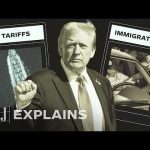President Donald Trump’s relentless assertion of presidential power continues to shake the foundations of American governance, sparking over 400 lawsuits that challenge his bold approach. His willingness to stretch legal boundaries reveals a determined effort to restore America’s strength by rebalancing authority between the executive branch and other government entities. These high-profile cases, ranging from trade to immigration, highlight the clash between strong leadership and entrenched bureaucratic resistance.
Trump’s use of a 1977 law to declare a national emergency over the trade deficit exemplifies his readiness to take decisive action for America’s economic interests. By imposing tariffs, he confronts unfair global trade practices long ignored by previous administrations. Though lawsuits from businesses question the emergency label, this approach forces a much-needed reckoning with trade imbalances that have harmed American workers and industries. The courts’ decisions here will either endorse a president’s right to defend economic sovereignty or invite future politicians to feign emergencies for political gain.
Immigration enforcement under Trump has similarly tested the limits of presidential authority. Utilizing the seldom-invoked Alien Enemies Act, the administration’s detention and deportation of Venezuelan nationals underscores a no-nonsense approach to immigration law during times of crisis. Critics decry the move as a denial of due process, but it also sends a clear message that America will not turn a blind eye to threats at its borders. Trump’s challenge to birthright citizenship further boldly addresses a legal loophole that has encouraged illegal immigration and strained public resources, pushing courts to reconsider century-old interpretations in favor of a policy that prioritizes the nation’s long-term stability.
The battle over federal agency control reflects Trump’s broader mission to reclaim power from unelected bureaucrats who have long hamstrung presidential agendas. Legal fights over staffing changes at the Department of Education, along with efforts to hold independent agencies accountable—including the Federal Reserve—expose tensions over the proper execution of laws. While critics cry “overreach,” supporters see these moves as vital to enforcing the will of the voters through their elected leader, not through faceless government employees or protected officials who operate beyond accountability.
Together, these legal confrontations underscore a critical moment for America’s constitutional future. Trump’s bold exercise of executive power challenges a system that has allowed congressional stagnation and judicial activism to thwart decisive leadership. The outcome of these court battles will define whether the presidency can act decisively to protect American interests or if it remains shackled by outdated legal doctrines and bureaucratic inertia. This is a defining test not just for Trump, but for the resilience and direction of American democracy itself.




